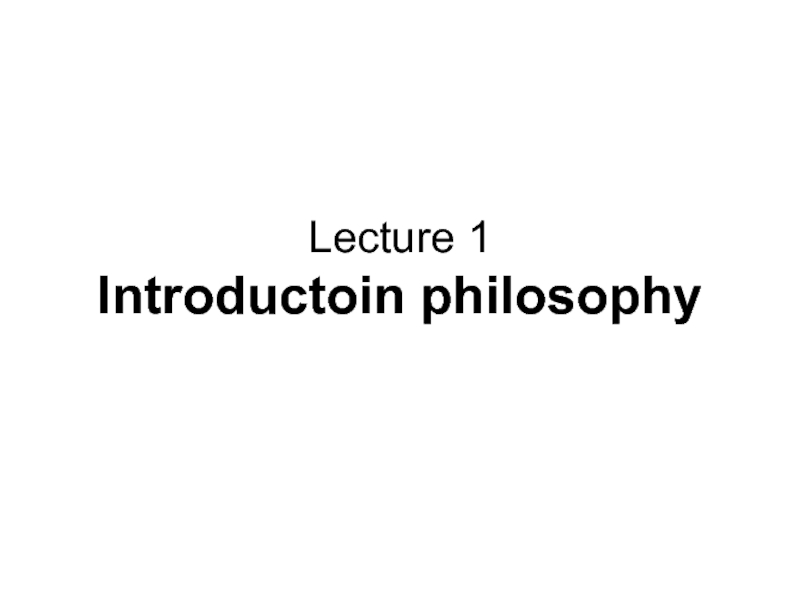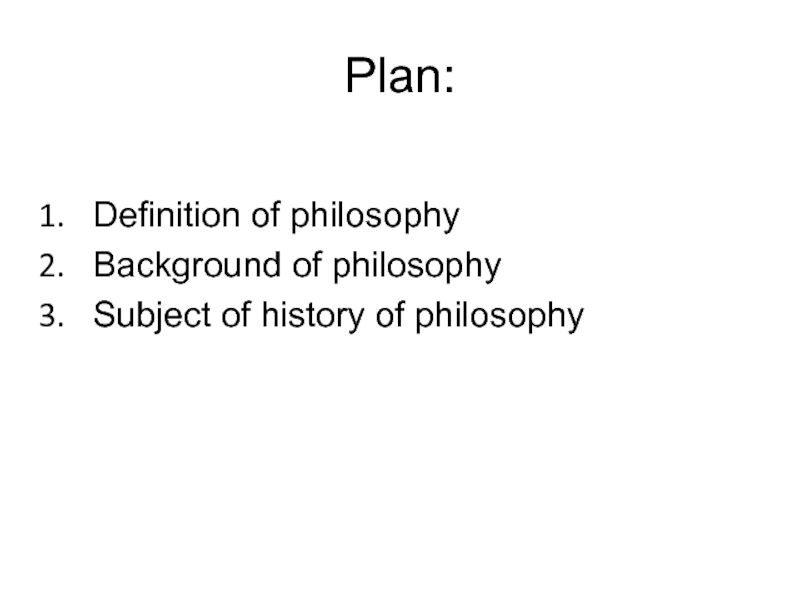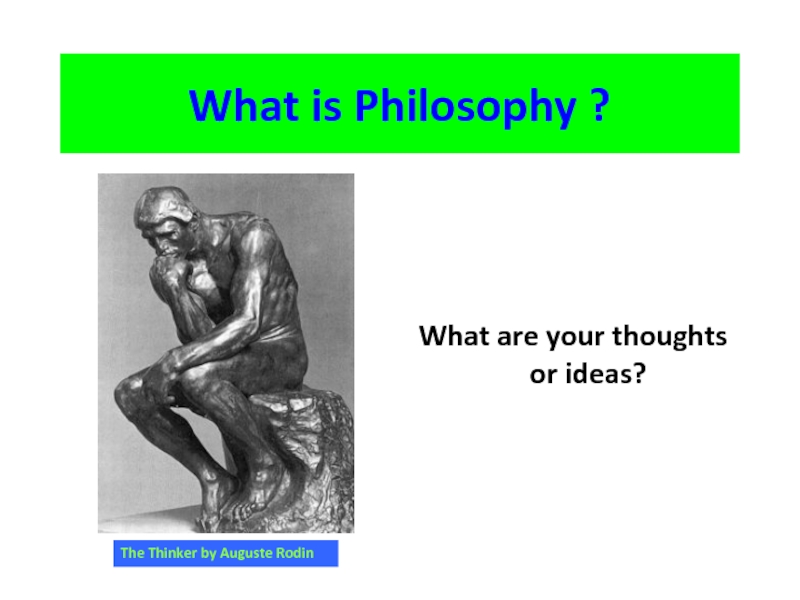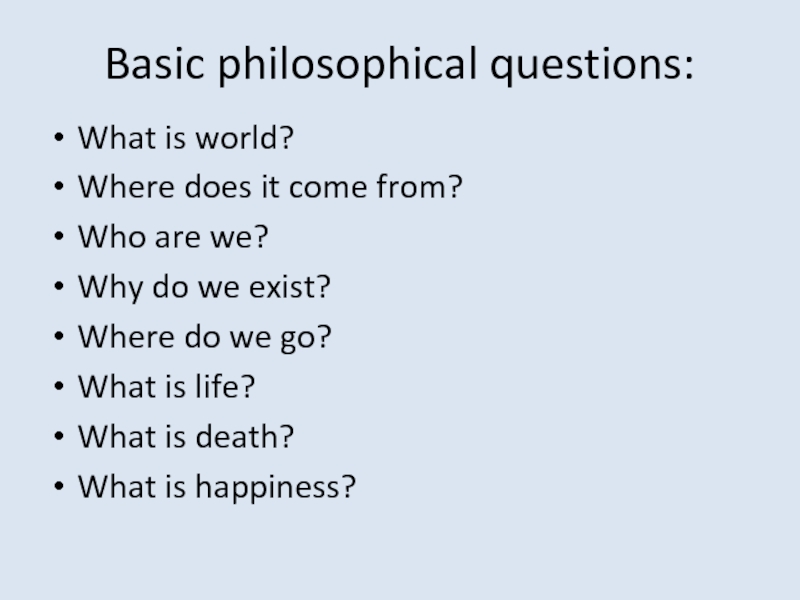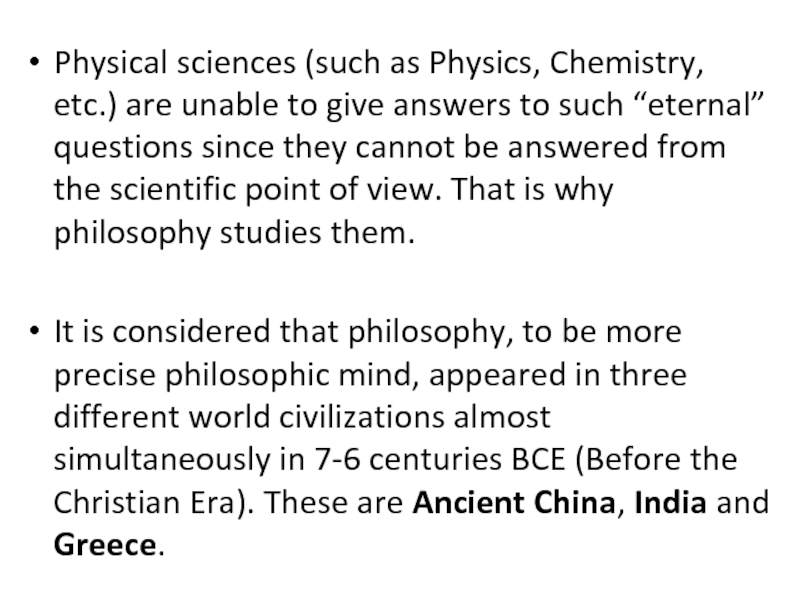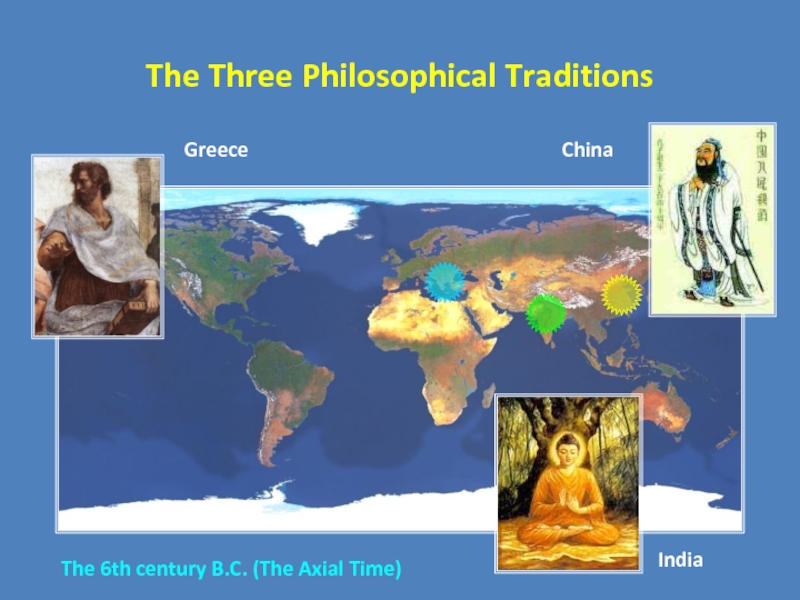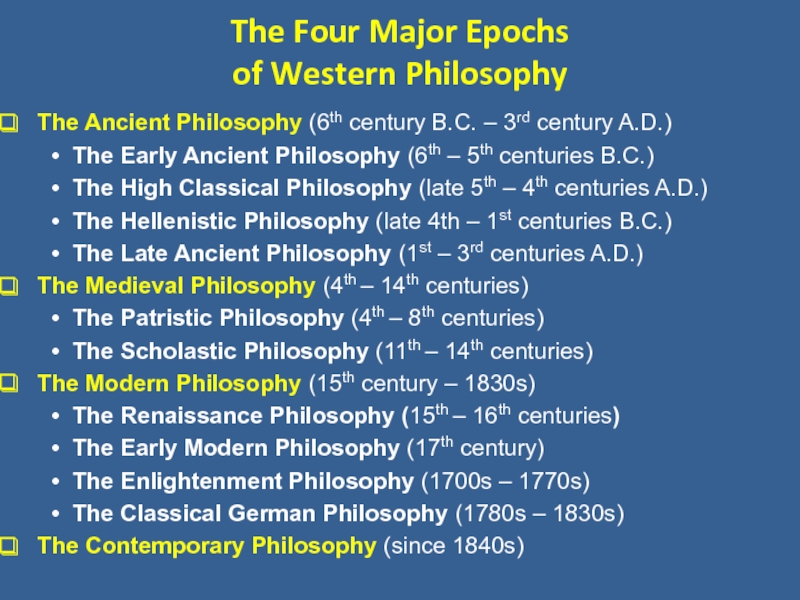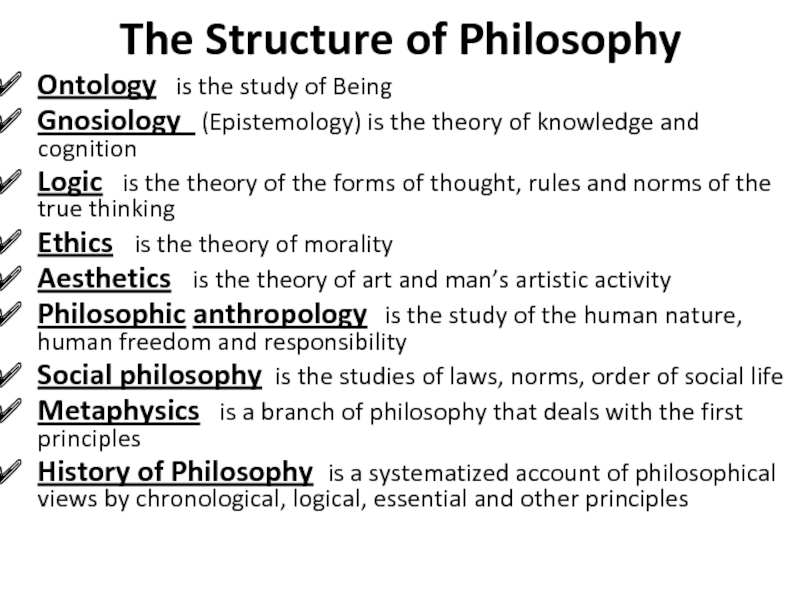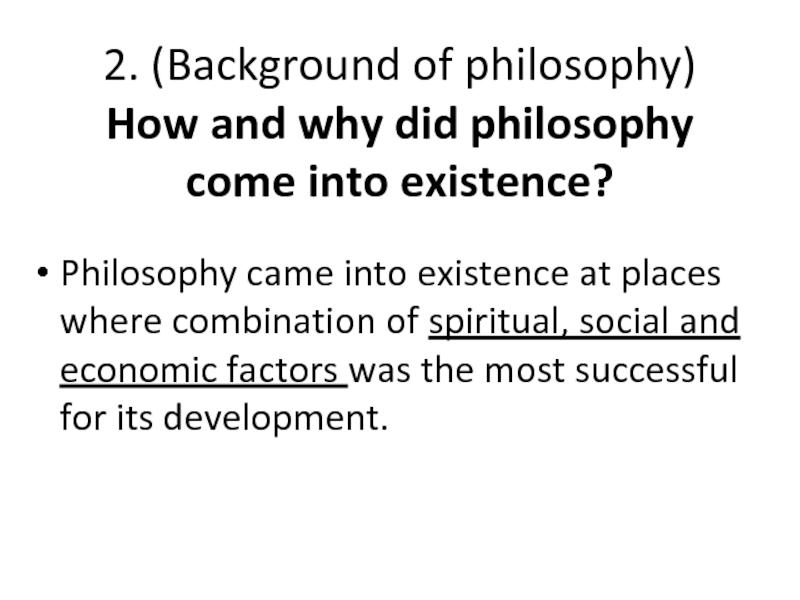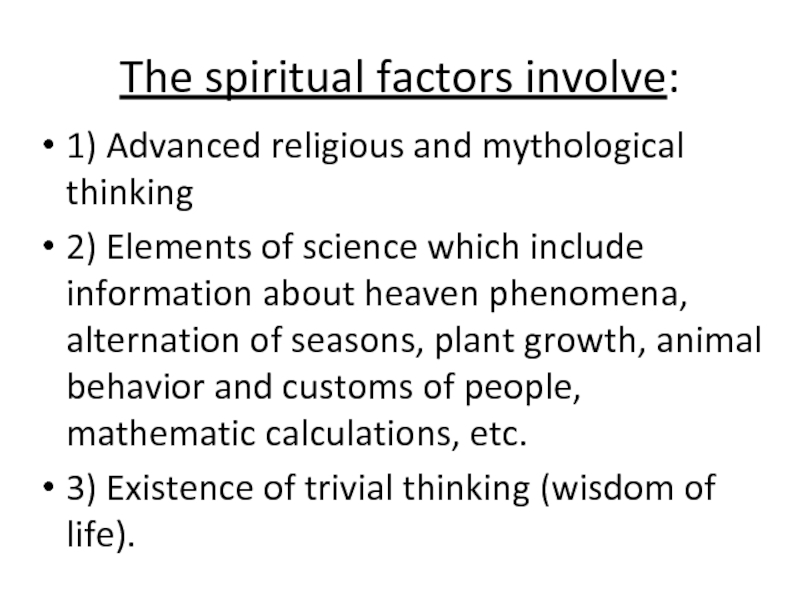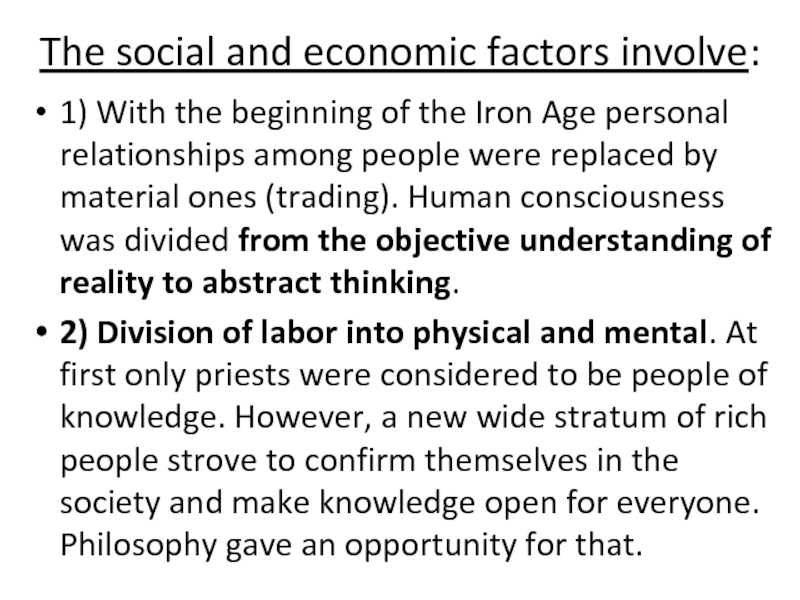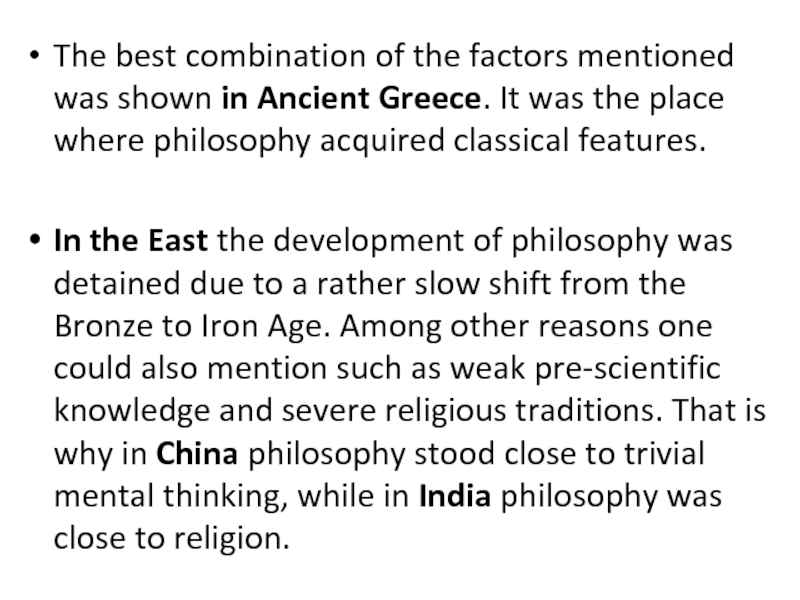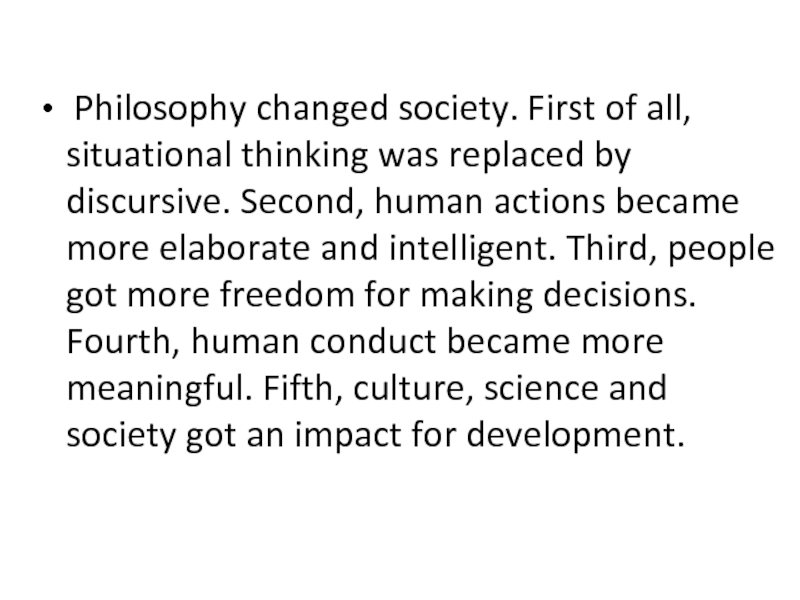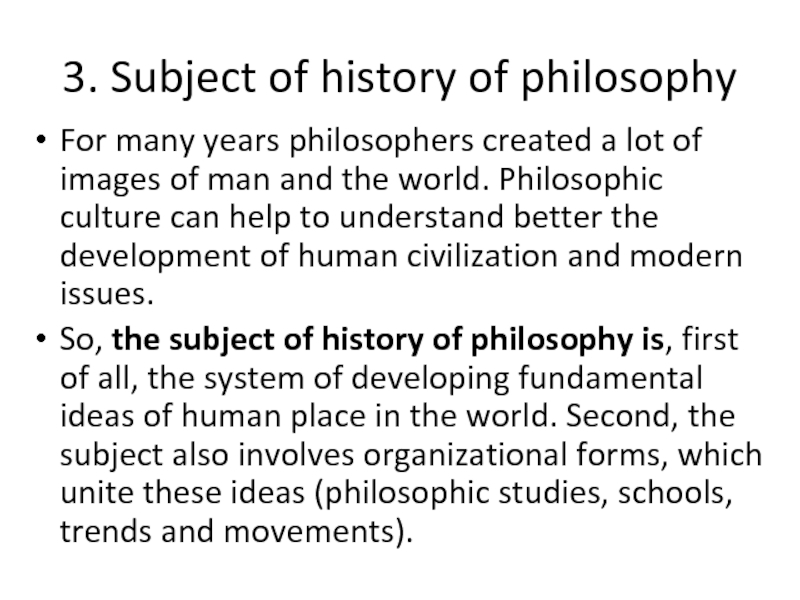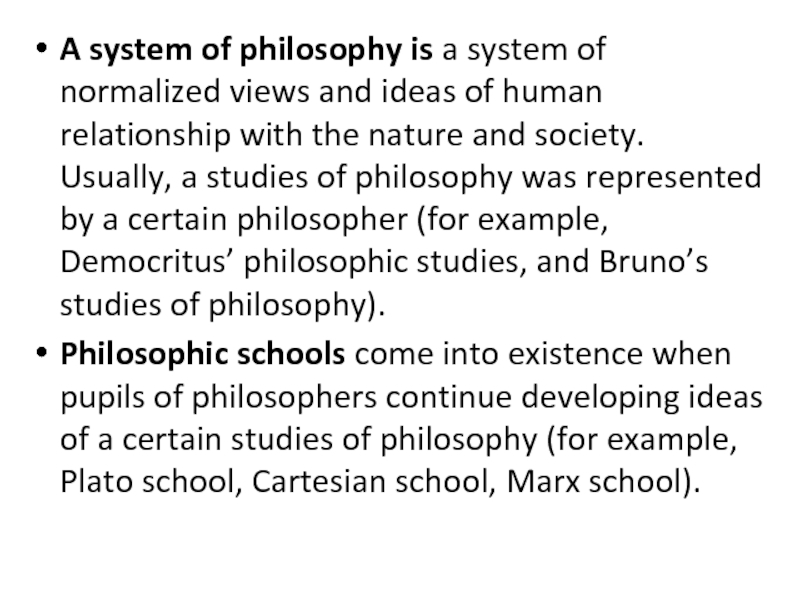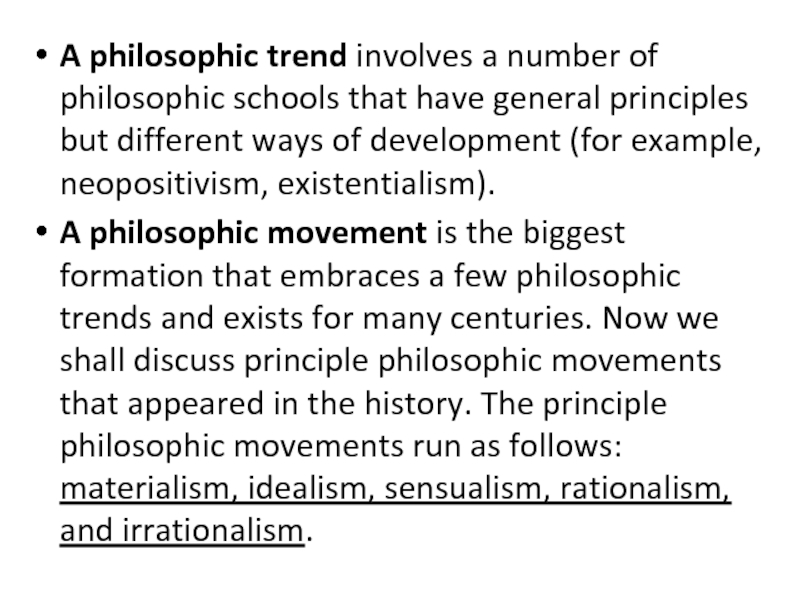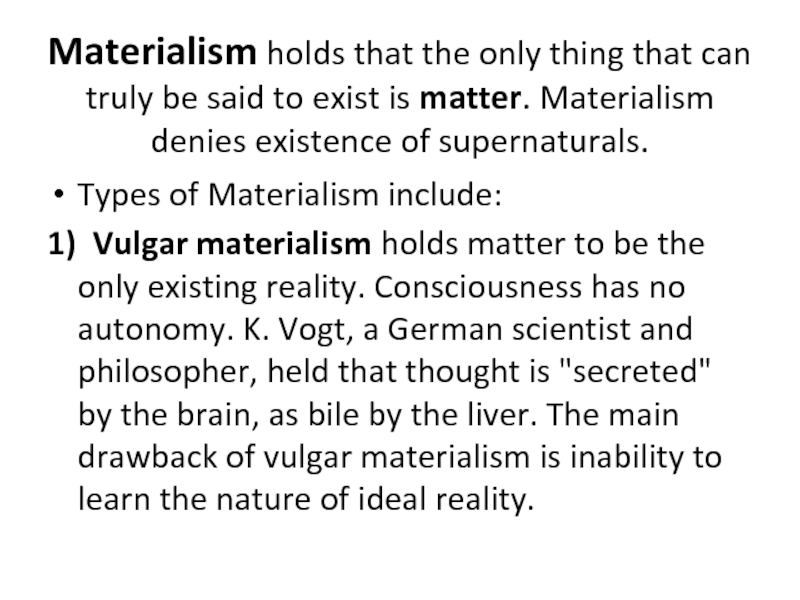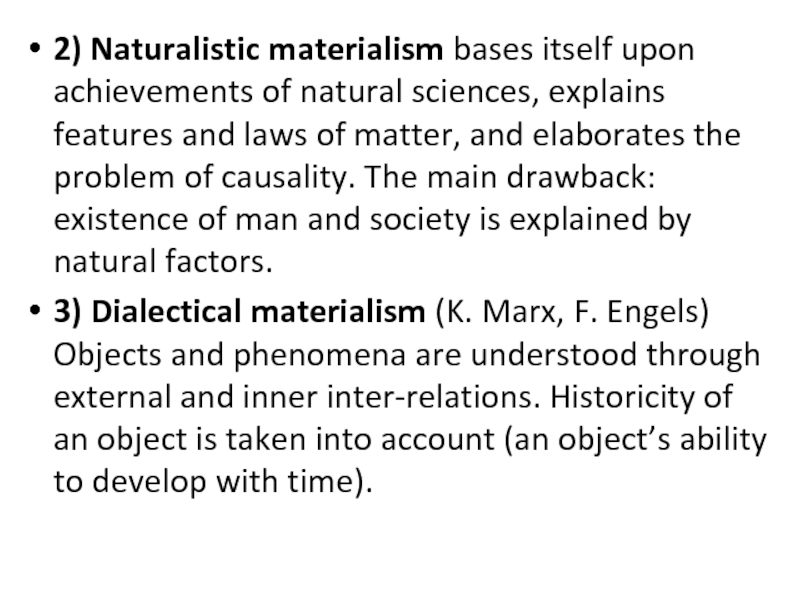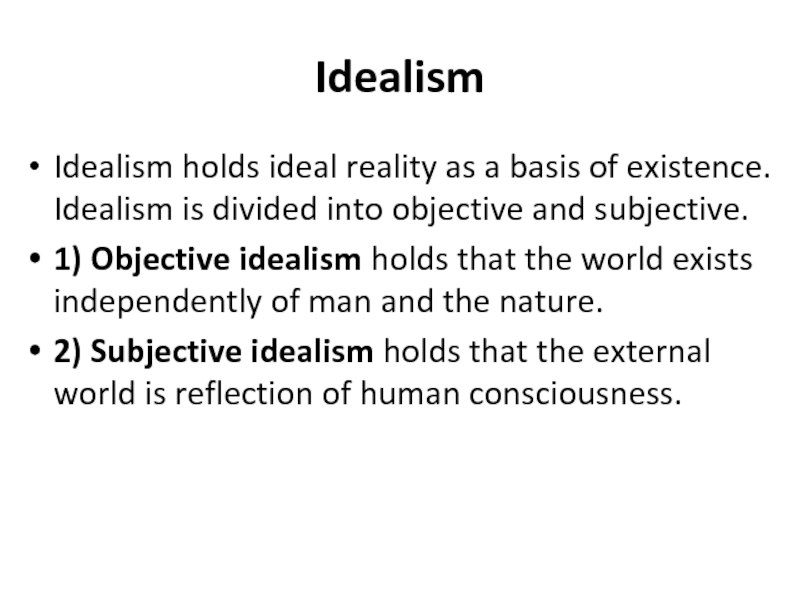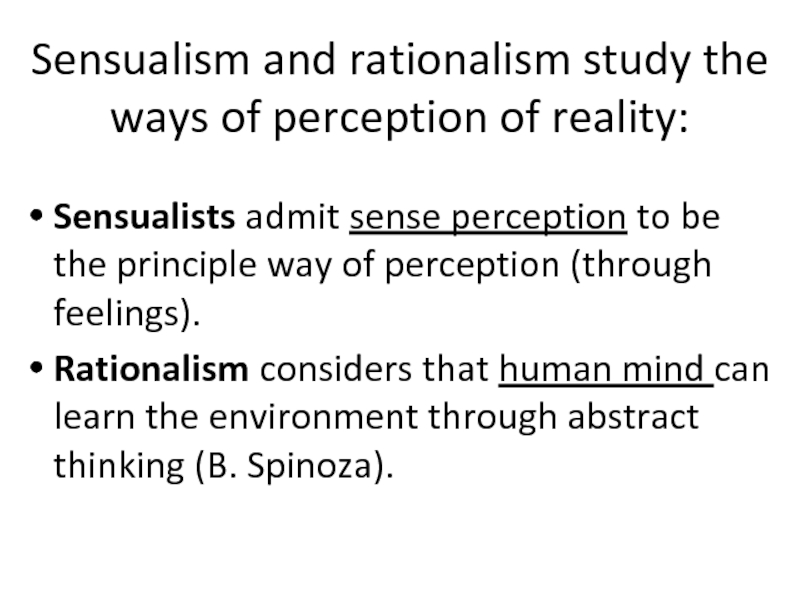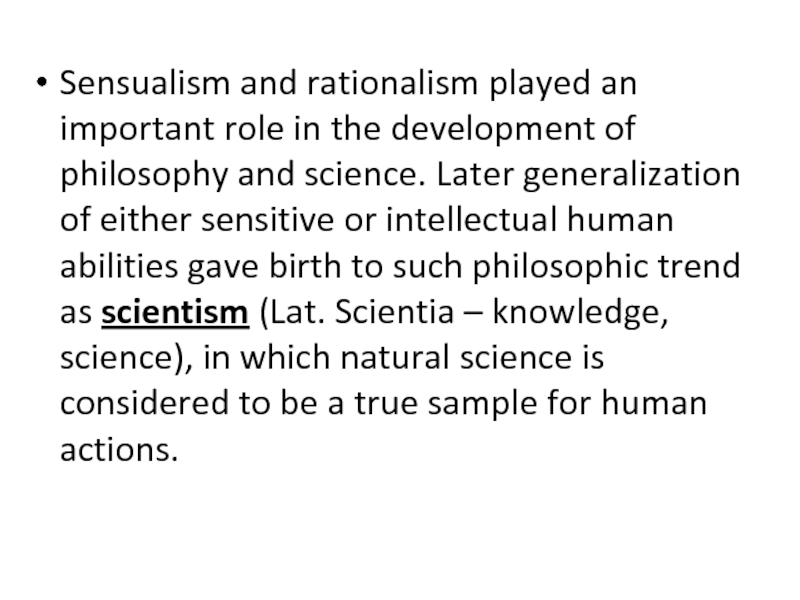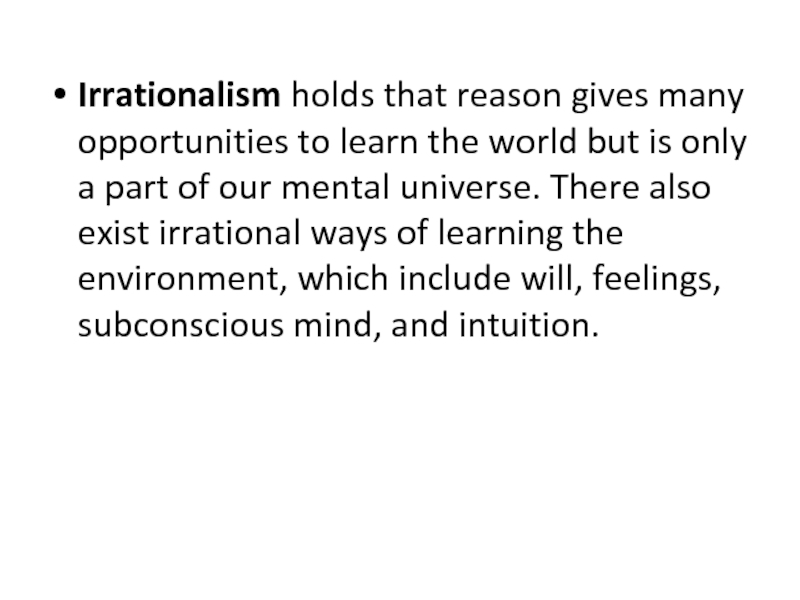Разделы презентаций
- Разное
- Английский язык
- Астрономия
- Алгебра
- Биология
- География
- Геометрия
- Детские презентации
- Информатика
- История
- Литература
- Математика
- Медицина
- Менеджмент
- Музыка
- МХК
- Немецкий язык
- ОБЖ
- Обществознание
- Окружающий мир
- Педагогика
- Русский язык
- Технология
- Физика
- Философия
- Химия
- Шаблоны, картинки для презентаций
- Экология
- Экономика
- Юриспруденция
Lecture 1 Introductoin philosophy
Содержание
- 1. Lecture 1 Introductoin philosophy
- 2. Plan:Definition of philosophyBackground of philosophySubject of history of philosophy
- 3. What is Philosophy ?What are your thoughts or ideas?The Thinker by Auguste Rodin
- 4. What is philosophy?Philosophy is a system of
- 5. Basic philosophical questions:What is world? Where does
- 6. Basic Human QuestionsIs there a god?Can we
- 7. Physical sciences (such as Physics, Chemistry, etc.)
- 8. The Three Philosophical TraditionsGreeceChinaIndiaThe 6th century B.C. (The Axial Time)
- 9. The Four Major Epochs of Western PhilosophyThe
- 10. The Structure of PhilosophyOntology is the
- 11. 2. (Background of philosophy) How and why
- 12. The spiritual factors involve:1) Advanced religious and
- 13. The social and economic factors involve:1) With
- 14. 3) Transparent political system. Many Greek polises
- 15. The best combination of the factors mentioned
- 16. Philosophy changed society. First of all,
- 17. 3. Subject of history of philosophyFor many
- 18. A system of philosophy is a system
- 19. A philosophic trend involves a number of
- 20. Materialism holds that the only thing that
- 21. 2) Naturalistic materialism bases itself upon achievements
- 22. IdealismIdealism holds ideal reality as a basis
- 23. Sensualism and rationalism study the ways of
- 24. Sensualism and rationalism played an important role
- 25. Irrationalism holds that reason gives many opportunities
- 26. Thank you for attention!
- 27. Скачать презентанцию
Слайды и текст этой презентации
Слайд 4What is philosophy?
Philosophy is a system of worldview ideas, which
reveal human attitude to the world and serve as guidelines
for human actions.There is another definition:
Philosophy is a science of general derivative laws and human attitude to the world.
The term philosophy comes from the Greek words “phileo” – love and “sophia” – wisdom, and means “love of wisdom”.
Слайд 5Basic philosophical questions:
What is world?
Where does it come from?
Who are we?
Why do we exist?
Where do we
go? What is life?
What is death?
What is happiness?
Слайд 6Basic Human Questions
Is there
a god?
Can we communicate with spirits?
What
is the purpose of life?
Is war good or evil?
Is science
more important than faith? What is justice?
Is social harmony
better than freedom?
What is
happiness?
Do humans have rights?
How should we treat the environment?
Слайд 7Physical sciences (such as Physics, Chemistry, etc.) are unable to
give answers to such “eternal” questions since they cannot be
answered from the scientific point of view. That is why philosophy studies them.It is considered that philosophy, to be more precise philosophic mind, appeared in three different world civilizations almost simultaneously in 7-6 centuries BCE (Before the Christian Era). These are Ancient China, India and Greece.
Слайд 9The Four Major Epochs
of Western Philosophy
The Ancient Philosophy (6th century
B.C. – 3rd century A.D.)
The Early Ancient Philosophy (6th –
5th centuries B.C.)The High Classical Philosophy (late 5th – 4th centuries A.D.)
The Hellenistic Philosophy (late 4th – 1st centuries B.C.)
The Late Ancient Philosophy (1st – 3rd centuries A.D.)
The Medieval Philosophy (4th – 14th centuries)
The Patristic Philosophy (4th – 8th centuries)
The Scholastic Philosophy (11th – 14th centuries)
The Modern Philosophy (15th century – 1830s)
The Renaissance Philosophy (15th – 16th centuries)
The Early Modern Philosophy (17th century)
The Enlightenment Philosophy (1700s – 1770s)
The Classical German Philosophy (1780s – 1830s)
The Contemporary Philosophy (since 1840s)
Слайд 10The Structure of Philosophy
Ontology is the study of Being
Gnosiology
(Epistemology) is the theory of knowledge and cognition
Logic
is the theory of the forms of thought, rules and norms of the true thinkingEthics is the theory of morality
Aesthetics is the theory of art and man’s artistic activity
Philosophic anthropology is the study of the human nature, human freedom and responsibility
Social philosophy is the studies of laws, norms, order of social life
Metaphysics is a branch of philosophy that deals with the first principles
History of Philosophy is a systematized account of philosophical views by chronological, logical, essential and other principles
Слайд 112. (Background of philosophy) How and why did philosophy come into
existence?
Philosophy came into existence at places where combination of spiritual,
social and economic factors was the most successful for its development. Слайд 12The spiritual factors involve:
1) Advanced religious and mythological thinking
2)
Elements of science which include information about heaven phenomena, alternation
of seasons, plant growth, animal behavior and customs of people, mathematic calculations, etc.3) Existence of trivial thinking (wisdom of life).
Слайд 13The social and economic factors involve:
1) With the beginning of
the Iron Age personal relationships among people were replaced by
material ones (trading). Human consciousness was divided from the objective understanding of reality to abstract thinking.2) Division of labor into physical and mental. At first only priests were considered to be people of knowledge. However, a new wide stratum of rich people strove to confirm themselves in the society and make knowledge open for everyone. Philosophy gave an opportunity for that.
Слайд 143) Transparent political system. Many Greek polises had electoral power
and publicity in social issues. That made logic and language
develop. Discussion and argumentation became common rules. Philosophy allowed people to prove their thoughts in disputes.Слайд 15The best combination of the factors mentioned was shown in
Ancient Greece. It was the place where philosophy acquired classical
features.In the East the development of philosophy was detained due to a rather slow shift from the Bronze to Iron Age. Among other reasons one could also mention such as weak pre-scientific knowledge and severe religious traditions. That is why in China philosophy stood close to trivial mental thinking, while in India philosophy was close to religion.
Слайд 16 Philosophy changed society. First of all, situational thinking was
replaced by discursive. Second, human actions became more elaborate and
intelligent. Third, people got more freedom for making decisions. Fourth, human conduct became more meaningful. Fifth, culture, science and society got an impact for development.Слайд 173. Subject of history of philosophy
For many years philosophers created
a lot of images of man and the world. Philosophic
culture can help to understand better the development of human civilization and modern issues.So, the subject of history of philosophy is, first of all, the system of developing fundamental ideas of human place in the world. Second, the subject also involves organizational forms, which unite these ideas (philosophic studies, schools, trends and movements).
Слайд 18A system of philosophy is a system of normalized views
and ideas of human relationship with the nature and society.
Usually, a studies of philosophy was represented by a certain philosopher (for example, Democritus’ philosophic studies, and Bruno’s studies of philosophy).Philosophic schools come into existence when pupils of philosophers continue developing ideas of a certain studies of philosophy (for example, Plato school, Cartesian school, Marx school).
Слайд 19A philosophic trend involves a number of philosophic schools that
have general principles but different ways of development (for example,
neopositivism, existentialism).A philosophic movement is the biggest formation that embraces a few philosophic trends and exists for many centuries. Now we shall discuss principle philosophic movements that appeared in the history. The principle philosophic movements run as follows: materialism, idealism, sensualism, rationalism, and irrationalism.
Слайд 20Materialism holds that the only thing that can truly be
said to exist is matter. Materialism denies existence of supernaturals.
Types of Materialism include:
1) Vulgar materialism holds matter to be the only existing reality. Consciousness has no autonomy. K. Vogt, a German scientist and philosopher, held that thought is "secreted" by the brain, as bile by the liver. The main drawback of vulgar materialism is inability to learn the nature of ideal reality.
Слайд 212) Naturalistic materialism bases itself upon achievements of natural sciences,
explains features and laws of matter, and elaborates the problem
of causality. The main drawback: existence of man and society is explained by natural factors.3) Dialectical materialism (K. Marx, F. Engels) Objects and phenomena are understood through external and inner inter-relations. Historicity of an object is taken into account (an object’s ability to develop with time).
Слайд 22Idealism
Idealism holds ideal reality as a basis of existence. Idealism
is divided into objective and subjective.
1) Objective idealism holds
that the world exists independently of man and the nature. 2) Subjective idealism holds that the external world is reflection of human consciousness.
Слайд 23Sensualism and rationalism study the ways of perception of reality:
Sensualists
admit sense perception to be the principle way of perception
(through feelings).Rationalism considers that human mind can learn the environment through abstract thinking (B. Spinoza).
